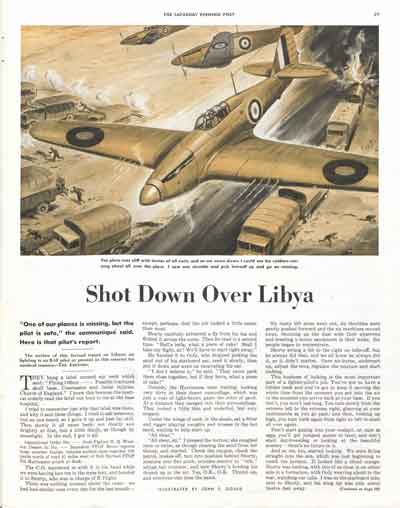Plane Crashes, the Libyan Desert, and Children’s Literature
There’s an interesting story connecting the Second World War and The Fantastic Mister Fox — the animated movie just released by Twentieth Century Fox (no relation).
The connection was made by Roald Dahl, the best-selling author, and the Saturday Evening Post, and it began with British Flying Officer Dahl being “Shot Down Over Libya.”

by Roald Dahl
August 1, 1942
He survived the crash, but suffered multiple injuries and months of blindness. Eventually he was sent to Washington to work with the British novelist C. S. Forester. Forester and Dahl were working to promote the interests of Great Britain during the war. Forester was writing adventure novels in his Captain Hornblower series at this time. He had also published several stories in the Saturday Evening Post. He encouraged Dahl to write of his own experiences as a fighter pilot. The Post published Dahl’s first work in its August 1, 1942 issue. For reasons of military security, Dahl could not identify himself or his fighter unit, so the article appeared anonymously.
His first publishing encouraged Dahl to continue writing. After the war he produced several works, including highly successful children’s books: James and the Giant Peach, Matilda, The Witches, and Charlie and the Chocolate Factory (which gained fame as Willy Wonka and the Chocolate Factory.)
By coincidence, another plane crash in the Libyan desert inspired another children’s author, Antoine de Saint Exupéry.
In 1935, Saint Exupery was flying from Paris to Saigon when his plane went down in the North African wilderness. He and his navigator were barely clinging to life when they were rescued after four days with almost no food and water. Seven years later, while living in the United States, Saint Exupery wrote the very popular novella The Little Prince. The story involves several fantastic characters, but centers around a pilot who is struggling to stay alive after his plane has crashed in the desert.